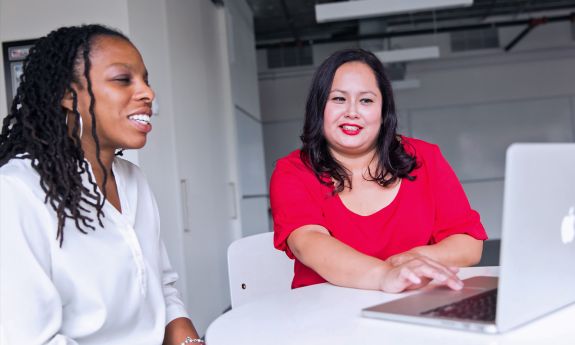From Mentor to Mentee, Colleagues Reflect on Guiding Others
Insights from Duke staff and faculty on building supportive relationships to foster professional growth

While Duke offers some professional development programs with a built-in mentorship component, many mentor-mentee relationships develop naturally. It often begins with identifying potential mentors who align with goals, reaching out for guidance, and fostering a mutually beneficial relationship based on trust and shared interests.
“When I think about why people engage in mentoring relationships, it’s about acceleration,” said Gina Rogers, Associate Director of Duke Learning & Organization Development (L&OD). “Getting with a mentor can really excel and accelerate the progress around broadening and deepening a particular skillset.”
How do you find a mentor? Here are some insights from staff and faculty.
Approaching a Mentor

When Dr. Orin Starn, professor of Cultural Anthropology, came to Duke University as a junior faculty member in 1992, he connected with Dr. Richard Fox, then chair of the department.
Fox was key for helping Starn establish his career in the field. He invited Starn and his partner over for dinner shortly after they moved to Durham and encouraged him to submit research to journals. Fox also introduced Starn to senior scholars in the field and eventually the two organized a conference and co-edited a book together. Though Fox retired in 2005, the pair continue to meet occasionally today.
“Every time I see him, I tell him how grateful I am for him and how much his support meant to me,” Starn said.
That mentor relationship taught Starn lessons he’s taken into the rest of his career about how to connect with a mentor. And after being recently honored with the 2023 Duke Graduate School Dean’s Award for Excellence in Mentoring, Starn has been on both sides of a successful mentor relationship.
Starn said mentees should look for a more experienced person in their field whom they like and respect. And at the start of that relationship, both people need to get to know each other first before any asks are made. He recommends once you’ve identified someone who has experience, to invite them to lunch or coffee and get to know them.
“You can’t establish a mentor relationship just in the classroom or at the office,” Starn said. “What really brings it to the next level is establishing a relationship that’s not just a work friendship.”
After a relationship has developed, Starn said a mentee can start asking for advice. But if you ask for help before getting to know the other person, it doesn’t provide quite the same benefits.
“I don’t think a mentorship can be declared out of the blue,” Starn said. “You can’t just walk up to somebody and say, ‘I’m going to be your mentor.’ It more develops out of conversations with a person caring about other people.”
Nurturing the Relationship

Tawana Reed started working at Duke in 2016, answering phones and scheduling appointments for the Duke Eye Center. Seven years later, she’s an Administrative Manager in the Doctor of Physical Therapy Program.
Combined with her own work, Reed credits her mentor, Kelly Macklin, for helping her grow her career.
When Reed and Macklin initially collaborated, a natural connection formed. As Reed excelled at administrative responsibilities, she developed a keen curiosity about Macklin's Human Resources position. Utilizing spare moments, she would visit Macklin's office to inquire about various Human Resources tasks like employee relations, policy interpretation, payroll, time cards, and other vital skills, with the aim of progressing into a managerial role.
“I think that experience was very instrumental in each of my promotions, working with her because of that institutional knowledge,” Reed said. “She’s given me so much time throughout the years to answer my questions.”
Their relationship continued after Macklin left the department. While Reed was in the Front Line Supervisors Program offered by L&OD, the pair met monthly as part of the Front Line Supervisors Program’s built-in mentorship component. Reed was able to ask questions, talk honestly and ask for guidance.
“When we come into that mentor-mentee relationship, it’s an opportunity for the mentee to let their guard down and be vulnerable,” L&OD’s Gina Rogers said. “That openness is really crucial to nurturing vulnerability and creating that bond.”
The Return on Giving Back

When Kellie Capes began mentoring her colleague, Hope Williams, at Duke Regional Hospital, she reflected on her own experience transitioning into a new role at a different hospital five years prior.
As time passed, Capes realized that the value of the mentorship wasn't just beneficial for her mentee, but also for herself. It wasn't solely about receiving awards and recognition. Discussing various scenarios and being challenged to think differently had expanded her leadership skills.
“I’ve grown,” Capes said.
When looking for mentorship opportunities, Capes suggested professionals with more experience shouldn’t only focus on how they can help along a new or younger colleague. Instead, they should consider how such relationships could enhance a career by learning from the perspective of colleagues in their field.
From the outset of their mentorship, each question Williams brought up for advice became an opportunity for intellectual exchange, allowing Capes to refine her own practices and reconsider her approaches to patient care and techniques.
As a result, their bond strengthened, and they formed a cohesive team. Both clinical nurse specialists now work together as collaborators, with no hierarchy, on the Duke Regional Hospital Tracheostomy team.
“It’s helpful to get the perspective of a newer person on a project I’m working on,” Capes said. “Their insights are valuable too.”
Send story ideas, shout-outs and photographs through our story idea form or write working@duke.edu.
Follow Working@Duke on X (Twitter), Facebook, and Instagram.